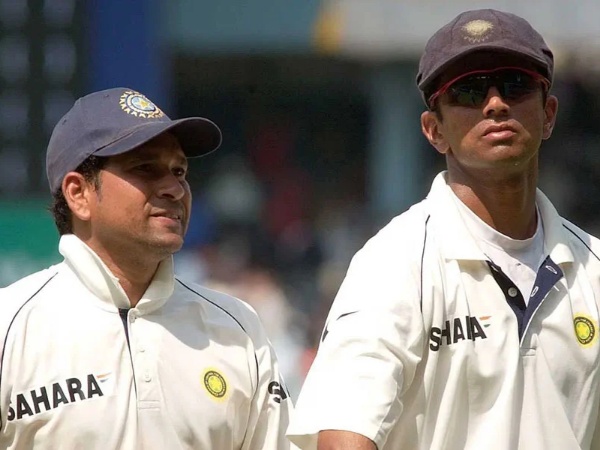All about the incident when Sachin Tendulkar was unhappy with the Indian captain
The 2004 Multan Test between Pakistan and India is often celebrated for Virender Sehwag’s extraordinary innings of 309 runs, marking the first triple century by an Indian batter in Test cricket. Sehwag’s monumental knock stole the headlines, but another significant moment from that match also captured the attention of fans and critics alike. During this Test, as the Indian team built a commanding total of 675/5, Sachin Tendulkar was in the midst of a stellar innings. He had reached 194 runs and was on the cusp of his double century when a pivotal decision was made. Indian captain Rahul Dravid, facing a crucial tactical choice, decided to declare the innings. This declaration came at a moment when Tendulkar was just six runs away from achieving his milestone of 200 runs.
Dravid’s decision to declare, leaving Tendulkar short of his double century, was a strategic move aimed at maximizing the time available to dismiss the Pakistani side and secure a favorable result in the match. Although the declaration meant Tendulkar fell agonizingly short of his double hundred, the move underscored the priorities of team strategy over individual milestones. This moment remains a notable part of the match's narrative, highlighting the balance between personal achievement and team objectives in cricket. While Tendulkar's 194 was left incomplete, the match itself was a testament to India’s dominance and the significance of strategic decisions in Test cricket.
Former India cricketer Aakash Chopra recalled that the 2004 Multan Test was the first instance he saw Sachin Tendulkar visibly disappointed. Chopra, who was part of the Indian dressing room during the match, observed the scene closely. Tendulkar, having been left six runs short of a double century due to the declaration of the innings by captain Rahul Dravid, showed signs of frustration. Chopra, being relatively young at the time, chose not to participate in the discussions or express his views on the matter. Instead, he silently witnessed the emotional moment, noting the weight of the situation. Despite Tendulkar’s evident disappointment, Chopra recognized the strategic importance of Dravid’s decision to declare and the need to prioritize the team’s overall success over individual milestones.
This episode not only highlighted Tendulkar’s deep personal drive for achievement but also provided Chopra with a valuable insight into the complexities of balancing personal and team goals in cricket. The moment remains a poignant reminder of the emotional and strategic dimensions that shape a cricketer’s career and the high stakes involved in international cricket.
“I was in the dressing room, but I wasn't part of that conversation. To be very honest, I didn't even try to get into it because I was too young. Yes, paaji wasn't happy that day. I think I saw him unhappy for the first time. I never saw him lose temper, and he didn't exactly lose temper that day but he was visibly unhappy. Something wasn't right,” former Indian opener Aakash Chopra said in a recent interview.
Aakash Chopra further clarified that the decision to declare the innings was not made by Rahul Dravid alone but was a collective choice of the entire team. Chopra revealed that while Dravid took the initiative to declare, it was a decision that involved input and consensus from the rest of the team members. Interestingly, Chopra also mentioned that Sourav Ganguly, who was not actively participating in the match as he was not part of the playing XI, was still present in the dressing room during that period. Ganguly’s presence and involvement in the decision-making process underscored the collaborative nature of the team’s strategy. His input, along with that of Dravid and the other players, was integral to the final decision to declare the innings, despite Tendulkar being on 194 and just short of his double century.
This insight into the decision-making process highlights the importance of team dynamics and the shared responsibility among players in crucial moments. It reflects how strategic choices in cricket are often a result of collective deliberation rather than the sole discretion of any individual, emphasizing the unity and collaborative spirit within the team.
“Rahul did call, but Dada (Ganguly) was part of the dressing room that day too. He wasn't playing in that game, but he was in dressing room and I'm sure he was part of the think-tank. It wasn't the captain's decision alone,” Chopra added."After the game, Rahul did say that he wouldn't have declared had he known the match would end within 4 days,” he concluded.
